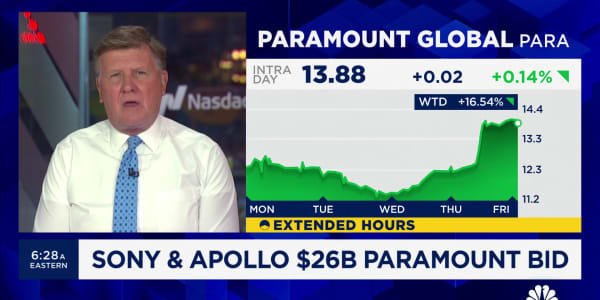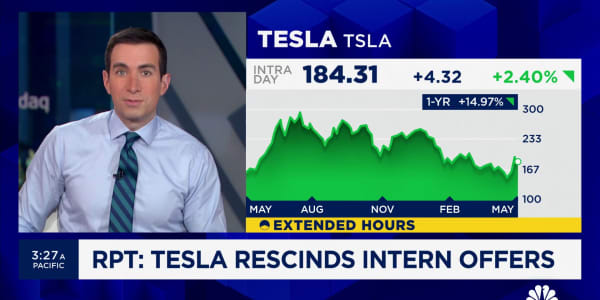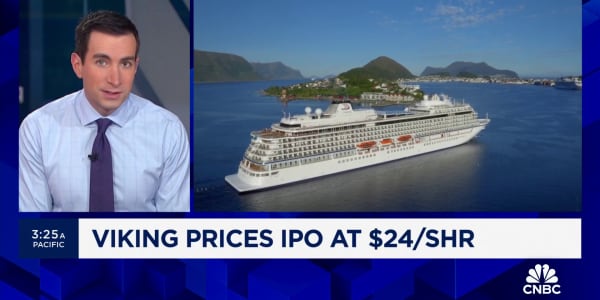Recapping the day's news and newsmakers through the lens of CNBC.
Notes:
Apple shares were up smartly today after the firm confirmed a new iPhone distribution deal with China Mobile. But some analysts warned investors not to expect a dramatic jump in sales in China like Apple recently enjoyed in Japan.
In Japan, competition between service providers makes the iPhones virtually free to consumers. This is not so in China. Also, Chinese phone manufacturers sell Android phones that are much cheaper than iPhones. There's no doubt, though, that better access to Chinese consumers is good for Apple in the long run, assuming Chinese incomes rise.
Quote:
"The [Chinese] market is actually much smaller than that 750 million [population] figure. It's an important deal but let's not get carried away."—Alastair Newton, senior political analyst at Nomura
Hook, line and sinker
Notes:
It may be too early to chisel BlackBerry's epitaph in stone, but some skeptics continue to work on a first draft. What that epitaph should say, essentially, is that BlackBerry erred in tying its brand too closely to its device.
The struggling firm on Friday reported a monumental $4.4 billion third-quarter write-down for unsold inventory, as the devices have lost appeal. It is trying to save itself with less emphasis on the devices themselves and more on the software and services, like messaging, that the firm offers corporate and government clients. Some investors are buying into the vision of new CEO John Chen, with shares gaining since he was hired to engineer a turnaround.
But once-loyal corporate IT departments are already looking elsewhere. Once they move to other firms' devices, like those from Apple and Samsung, they may not see much reason to stick with services and software from BlackBerry, even if they're perfectly sound. After these customers are lost, they'll be very hard to get back.
Quote:
"The [BlackBerry] device was the hook and they were supplying everything else. But if I don't want the device anymore, then I move on all together and I get tools that are designed for the new device."—Carolina Milanesi, a technology analyst
Lost in the Amazon
Notes:
Amazon is no Blackberry—everything's going gangbusters. But experts are debating just how long the stock can keep going up absent bigger profits. The retailer's shares are now trading above $400, for a 12-month gain of more than 57 percent.
The problem is, Amazon earns just 28 cents a share, for a price-to-earnings ratio of more than 1,400. That's nearly 1,000 times the S&P 500's long-term average of around 15. So to get to "normal," the share price has to fall or earnings have to rise. By a lot.
The company's admirers point out that CEO Jeff Bezos' heavy emphasis on pouring revenue into growth causes the low reported earnings, and that Bezos can quickly allow earnings to soar once he's satisfied Amazon has become the world's dominant retailer. Some say a better gauge of Amazon is the price-to-sales ratio, which is not nearly as outlandish. But anyone who lived through the dot-com bubble knows the danger of thinking traditional gauges like profits don't matter.
Quote:
"The company has gone through a major investment cycle before. And what the market has essentially done is said: 'Instead of waiting, I'm going to buy it on faith.'"—Mark Mahaney of RBC Capital Markets
Spending high
Notes:
Spending lifted to its highest level in five months in November, up 0.5 percent compared to 0.4 percent in October. Adjusted for inflation, the increase in "real" consumer spending was the highest since February 2012. Over the past year, core inflation, which excludes food and energy, was up just 1.1 percent. Given this strength, it's not surprising that consumer sentiment rose to its highest level in five months. All of this bodes well for fourth-quarter economic results.
Quote:
"Personal finances, the most critical factor that shapes consumer spending, did improve in late December, although largely due to rising incomes and wealth among those in the top third."— Richard Curtin, director of the Thomson Reuters/University of Michigan's overall index of consumer sentiment
Wear and tear
Notes:
Jos. A. Bank Clothiers and Men's Wearhouse are like the perfect couple that just can't make it down the aisle.
The latest installment of this soap opera has Jos. A Bank rejecting a $1.5 billion takeover offer from Men's Wearhouse, further frustrating Men's activist shareholders who've been pressing for a merger. Earlier, Men's Wearhouse had rejected a merger offer from Jos. A Bank. Neither company thinks the other is generous enough.
Each company is struggling in its own way, and matchmakers feel sure that if they'd stop squabbling over the dowry they'd make a great team.
Quote:
"When the team at Jos. A. Bank moves beyond its eggnog-induced hangover and hurt feelings, I suspect the two companies will merge as it's necessary to prepare both businesses for the future of retailing."—Brian Sozzi, chief executive of Belus Capital Advisors
—By Jeff Brown, Special to CNBC.com




